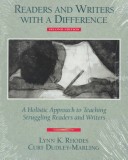When the first edition of Readers and Writers with a Difference appeared in 1988, it shattered the myth that whole language instruction was too unstructured and inexplicit to help remedial and learning disabled students. By providing specific assessment and instructional strategies, it was one of the first texts to show that struggling readers and writers could, indeed, benefit from holistic methods-not just in the resource room, but in the regular classroom as well.Today, as more and more students with learning problems are entering mainstream classroom settings, the models presented by Rhodes and Dudley-Marling are more cogent than ever. But the framework upon which whole language theory rests has greatly evolved since the first edition was published and has also come under increasing attack. This second edition renews the case for whole language theory, taking into account the various developments in language arts over the past eight years. Included are new and expanded sections on literacy theory, instruction and assessment, and literacy as social practice; and a reconsideration of how teachers, administrators, and parents might work and learn collaboratively.
The authors write, It is no longer possible to talk about approaches to teaching students to read (and write) once and for all, write the authors. Instead, we have to think about supporting students as they learn a range of literate practices . . . The second edition of Readers and Writers with a Difference offers myriad suggestions for making that range as rich and far reaching as possible.
- ISBN10 0435072153
- ISBN13 9780435072155
- Publish Date 23 September 1996
- Publish Status Unknown
- Publish Country GB
- Publisher Pearson Education Limited
- Imprint Heinemann
- Edition 2nd edition
- Format Paperback
- Pages 394
- Language English
